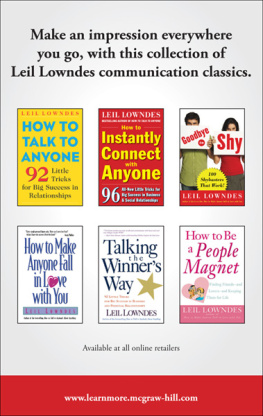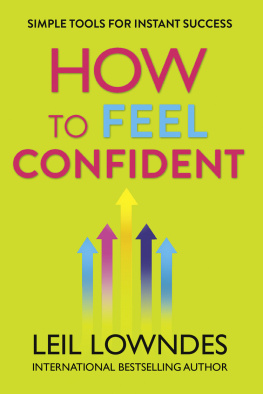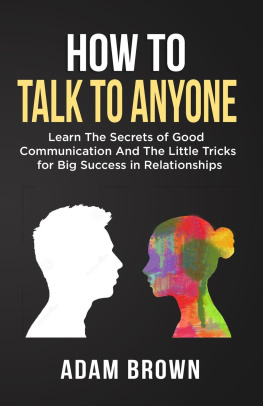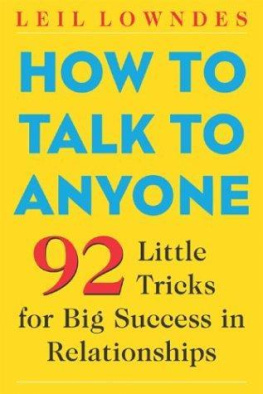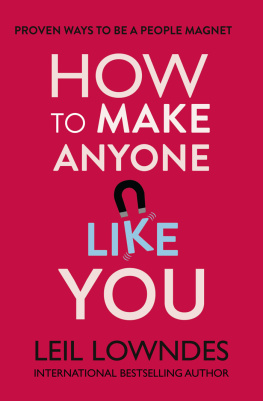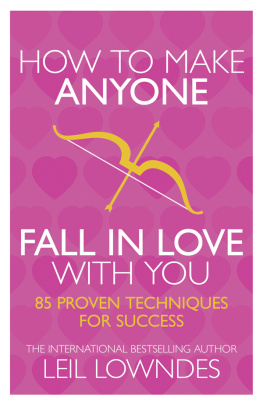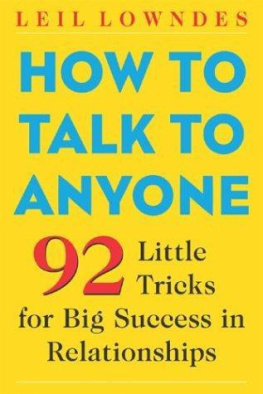
Copyright 2003 by Leil Lowndes. All rights reserved. Manufactured in the United States of America. Except as permitted under the United States Copyright Act of 1976, no part of this publication may be reproduced or distributed in any form or by any means, or stored in a database or retrieval system, without the prior written permission of the publisher.
ISBN: 978-0-07-143334-1
MHID: 0-07-143334-1
The material in this eBook also appears in the print version of this title: ISBN: 978-0-07-141858-4, MHID: 0-07-141858-X.
All trademarks are trademarks of their respective owners. Rather than put a trademark symbol after every occurrence of a trademarked name, we use names in an editorial fashion only, and to the benefit of the trademark owner, with no intention of infringement of the trademark. Where such designations appear in this book, they have been printed with initial caps.
McGraw-Hill eBooks are available at special quantity discounts to use as premiums and sales promotions, or for use in corporate training programs. To contact a representative please e-mail us at bulksales@mcgraw-hill.com.
TERMS OF USE
This is a copyrighted work and The McGraw-Hill Companies, Inc. ("McGraw-Hill") and its licensors reserve all rights in and to the work. Use of this work is subject to these terms. Except as permitted under the Copyright Act of 1976 and the right to store and retrieve one copy of the work, you may not decompile, disassemble, reverse engineer, reproduce, modify, create derivative works based upon, transmit, distribute, disseminate, sell, publish or sublicense the work or any part of it without McGraw-Hills prior consent. You may use the work for your own noncommercial and personal use; any other use of the work is strictly prohibited. Your right to use the work may be terminated if you fail to comply with these terms.
THE WORK IS PROVIDED "AS IS." McGRAW-HILL AND ITS LICENSORS MAKE NO GUARANTEES OR WARRANTIES AS TO THE ACCURACY, ADEQUACY OR COMPLETENESS OF OR RESULTS TO BE OBTAINED FROM USING THE WORK, INCLUDING ANY INFORMATION THAT CAN BE ACCESSED THROUGH THE WORK VIA HYPERLINK OR OTHERWISE, AND EXPRESSLY DISCLAIM ANY WARRANTY, EXPRESS OR IMPLIED, INCLUDING BUT NOT LIMITED TO IMPLIED WARRANTIES OF MERCHANTABILITY OR FITNESS FOR A PARTICULAR PURPOSE. McGraw-Hill and its licensors do not warrant or guarantee that the functions contained in the work will meet your requirements or that its operation will be uninterrupted or error free. Neither McGraw-Hill nor its licensors shall be liable to you or anyone else for any inaccuracy, error or omission, regardless of cause, in the work or for any damages resulting therefrom. McGraw-Hill has no responsibility for the content of any information accessed through the work. Under no circumstances shall McGraw-Hill and/or its licensors be liable for any indirect, incidental, special, punitive, consequential or similar damages that result from the use of or inability to use the work, even if any of them has been advised of the possibility of such damages. This limitation of liability shall apply to any claim or cause whatsoever whether such claim or cause arises in contract, tort or otherwise.
2 How to Strike Everyone as Intelligent and Insightful by Using Your Eyes
Its only a slight exaggeration to say Helen of Troy could launch ships with her eyes and Davy Crockett could stare down a bear. Your eyes are personal grenades that have the power to detonate peoples emotions. Just as martial arts masters register their fists as lethal weapons, you can register your eyes as psychological lethal weapons when you master the following eye-contact techniques.
Beloved people in the game of life look beyond the conventional wisdom that teaches "Keep good eye contact." For one, they understand that to certain suspicious or insecure people, intense eye contact can be a virulent intrusion.
When I was growing up, my family had a Haitian housekeeper whose fantasies were filled with witches, warlocks, and black magic. Zola refused to be left alone in a room with Louie, my Siamese cat. "Louie looks right through mesees my soul," shed whisper to me fearfully.
In some cultures, intense eye contact is sorcery. In others, staring at someone can be threatening or disrespectful. Realizing this, big players in the international scene prefer to pack a book on cultural body-language differences in their carry-on rather than a Berlitz phrase book. In our culture, however, big winners know exaggerated eye contact can be extremely advantageous, especially between the sexes. In business, even when romance is not in the picture, strong eye contact packs a powerful wallop between men and women.
A Boston center conducted a study to learn the precise effect. The researchers asked opposite-sex individuals to have a two-minute casual conversation. They tricked half their subjects into maintaining intense eye contact by directing them to count the number of times their partner blinked. They gave the other half of the subjects no special eye-contact directions for the chat.
When they questioned the subjects afterward, the unsuspecting blinkers reported significantly higher feelings of respect and fondness for their colleagues who, unbeknownst to them, had simply been counting their blinks.
Ive experienced the closeness intense eye contact engenders with a stranger firsthand. Once, when giving a seminar to several hundred people, one womans face in the crowd caught my attention. The participants appearance was not particularly unique. Yet she became the focus of my attention throughout my talk. Why? Because not for one moment did she take her eyes off my face. Even when I finished making a point and was silent, her eyes stayed hungrily on my face. I sensed she couldnt wait to savor the next insight to spout from my lips. I loved it! Her concentration and obvious fascination inspired me to remember stories and make important points Id long forgotten.
Right after my talk, I resolved to seek out this new friend who was so enthralled by my speech. As people were leaving the hall, I quickly sidled up behind my big fan. "Excuse me," I said. My fan kept walking. "Excuse me," I repeated a tad louder. My admirer didnt vary her pace as she continued out the door. I followed her into the corridor and tapped her shoulder gently. This time she whirled around with a surprised look on her face. I mumbled some excuse about my appreciating her concentration on my talk and wanting to ask her a few questions.
"Did you, uh, get much out of the seminar?" I ventured.
"Well, not really," she answered candidly. "I had difficulty understanding what you were saying because you were walking around on the platform facing different directions."
In a heartbeat, I understood. The woman was hearing impaired. I did not captivate her as I had suspected. She was not intrigued by my talk as I had hoped. The only reason she kept her eyes glued on my face was because she was struggling to read my lips!
Nevertheless, her eye contact had given me such pleasure and inspiration during my talk that, tired as I was, I asked her to join me for coffee. I spent the next hour recapping my entire seminar just for her. Powerful stuff this eye contact.
Make Your Eyes Look Even More Intelligent
There is yet another argument for intense eye contact. In addition to awakening feelings of respect and affection, maintaining strong eye contact gives you the impression of being an intelligent and abstract thinker. Because abstract thinkers integrate incoming data more easily than concrete thinkers, they can continue looking into someones eyes even during the silences. Their thought processes are not distracted by peering into their partners peepers.
Next page

